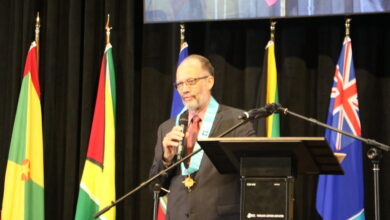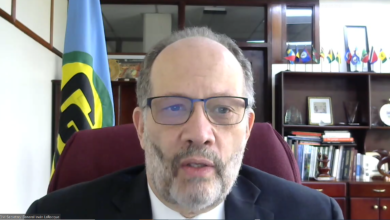CARICOM Secretariat, Turkeyen, Greater Georgetown, Guyana) It has always been my intention to interface with this group but circumstances have conspired to prevent me from doing so until now. So today is indeed a special occasion for me.
Let me, at the outset, highly commend the core institutions and member countries that are the active drivers of the CaribVET Network, especially the Centre de Coopération Internationale en Recherche Agronomique pour le Développement (CIRAD) and the Government of France through the Intereg-Programme. I take this opportunity also to commend the Network for its ability to co-ordinate its membership consisting of more than 31 countries and territories, and the ten regional and international organizations, universities and research institutes as they work together to define regional strategies for animal disease surveillance and control.
Madame Chairperson, within the recent past there is global recognition of the increased incidence of animal diseases which impact negatively on our food supply – especially of poultry, beef and swine. There is an increased concern regarding those pathogens which have the ability to cross from domestic livestock species to humans and so cause death and suffering. We have seen the ill health from outbreaks caused by pathogens such as e-coli and salmonella and have paid attention most recently to BSE (mad cow disease) and to Avian Influenza. The economic impact of such incidences is estimated in the billions of dollars. Outbreaks in poultry for example have seriously impacted livelihoods, the economy and international trade.
Globalization, trade, animal and human movements, all heighten the risk of disease circulation. In spite of resource and capacity constraints, the movement of people through air and sea travel, and the inadequacy of border control, our large geographic space remains relatively free of severe incidences of, or recurring animal diseases. But, we must not become complacent. We must design policies and strategies to strengthen and safeguard our relatively good animal disease status in the Caribbean, especially in the face of the worrying prognosis of a major disease burden. Forecasting models predict that an outbreak of disease could affect between 25-30 per cent of the population with potentially enormous economic costs worldwide, particularly in the poorest countries where resources for surveillance and health care are limited and population health and nutritional status are also poor.
A regional approach to monitoring and building skills in surveillance and control of animal diseases in the Caribbean is therefore, also essential. In this regard the Council for Trade and Economic Development (COTED) has recognised the critical role of the CaribVET.
The COTED, in May 2006, endorsed the use of the CaribVET Animal Health Network as a tool for animal health surveillance in the Region. Since then, each year, the COTED, through its Committee of Chief Veterinary Officers, receives reports and the recommendations emanating from this very body meeting here today.
The COTED strongly encourages and supports the activities and initiatives undertaken by the Network which are aimed at utilisation and building of expertise at all levels in the veterinary field with respect to research tools, policy measures, and programmes for surveillance. These capacity building initiatives are at both national and regional levels and this approach should be applauded and recommended as a best practice for achieving oneness of purpose in surveillance under the conditions of non contiguous borders, and scarce physical, financial and human resources.
Madam Chairperson, the CVOs in the Caribbean rate the introduction of live animals, both official and uncontrolled, as the primary route for the introduction of exotic animal diseases. The uncontrolled introduction of animal products by commercial, cargo and private boats is also of major concern. The CVOs have identified Highly Pathogenic Avian Influenza, Foot and Mouth Disease, Rabies, Newcastle Disease, and Classical Swine Fever as the 5 top priority diseases of the Caribbean.
Based on those concerns CaribVET has recommended that there is great need for countries to strongly collaborate and in this regard, the CaribVET offers the possibility to define regional strategies for surveillance and control, sharing expertise, developing technical programmes, and building capacity.
To further this end, Members of the Network have created a Charter for the Caribbean Animal Health Network which gives some more formal status, defines the organisational structure and sets out the objectives and operational procedures for the Network. The Charter is essential for facilitating the development of cohesive programmes, maintaining transparency, creating trust among all members, sharing information, mobilizing technical and financial resources, and engaging in cooperation agreements with international organizations. The CARICOM Secretariat has assisted in finalising the Charter which will be distributed to the Members at this Meeting.
Madam Chairperson, I assure you that the CARICOM Secretariat will continue its support and collaborative approach with CaribVET. To this end, we commit to engaging CaribVET on policy formulation, technical advice, and capacity-building initiatives under the Animal Health Components of our Agriculture Programme.
Further, over the next four years, approximately US$13M will be spent on SPS activities in the Caribbean Forum of African, Caribbean and Pacific States (CARIFORUM) as we implement the European Union funded SPS Programme under the 10th EDF. CaribVET’s involvement is expected to focus inter alia on the areas of building capacity in epidemiology and laboratory quality assurance.
With respect to the execution of the 2012 Agriculture Programme, there are cross-cutting issues that can benefit from the Network’s best practices and training as we focus on building the capacity of agricultural small holders-entrepreneurs who form the base of our food security across priority value chains targeted for expansion. CaribVET will be expected to work closely with the CARICOM Secretariat regarding the priority animal and animal products value chains.
Another area in which the CaribVET is expected to contribute to the development of the Region is in its relationship with the Caribbean Agricultural Health and Food Safety Agency (CAHFSA), which is expected to be operationalised this year. Primarily, CAHFSA will collaborate with CaribVET to ensure there is no duplication of efforts.
So Madam Chairperson, much is expected of the Network and I take this opportunity to once again congratulate the Members of the Network for the good work that is being done and to sincerely thank the Government of France, CIRAD, the United States Department of Agriculture (USDA), the Inter-American Institute for Co-operation in Agriculture (IICA) and the United Nations Food and Agriculture Organisation (FAO) for the tremendous technical and financial support they have provided to drive the activities of the Network. I want to say a special thank you to Dr Thierry LeFrancois and his team of specialists at CIRAD in Guadeloupe for their tremendous efforts in managing and organising the activities of the Network.
I wish you all a very productive meeting.
I thank you.




